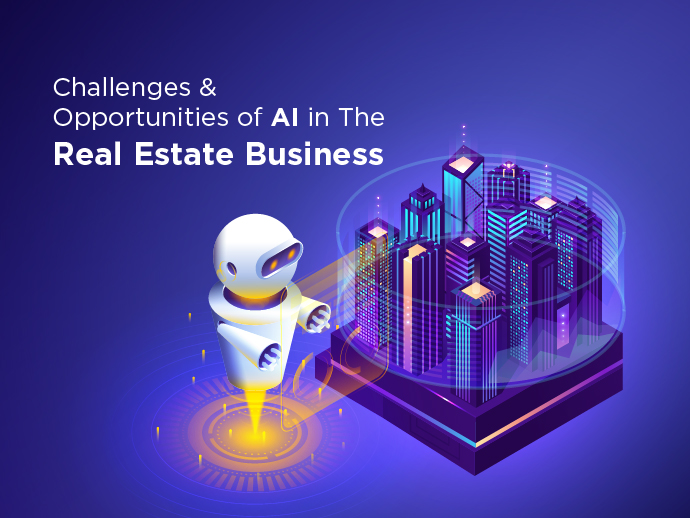Where time is of the essence and efficiency is the key, integrating Artificial Intelligence (AI) has become a game-changer for numerous industries, including real estate. The real estate business, which traditionally relied heavily on manual workflows, is no exception. The introduction of AI into this sector has revolutionized how business is conducted and opened up a world of new possibilities. However, as with any technological advancement, incorporating AI into real estate comes with its own challenges and opportunities.
AI in Real Estate
AI, or artificial intelligence, is revolutionizing the real estate sector by introducing cutting-edge capabilities to streamline operations and enhance customer experiences. From AI-powered property valuation algorithms that process vast amounts of data in seconds to virtual assistants that offer instant customer support, AI and real estate synergy is reshaping how properties are bought, sold, and managed. As AI continues to advance, it's crucial for the industry to harness its potential responsibly, addressing challenges like data privacy and algorithm bias to ensure a more efficient and equitable real estate landscape.
This blog will explore how Artificial Intelligence in real estate poses new opportunities and challenges and what other related aspects are.
Embracing Efficiency Through AI
AI has become a catalyst for boosting work efficiency and time management across various sectors. Once entangled in mundane, manual processes, real estate is now leveraging AI to streamline operations. The advantages are manifold – from quicker data analysis to predictive insights, AI transforms how properties are marketed, transactions are conducted, and customer relationships are managed.
OPPORTUNITIES
-
Chatbots :
One of the most noticeable ways AI enhances the real estate experience is through implementing chatbots. These virtual assistants are available 24/7, catering to client inquiries, providing property details, and scheduling site visits. Chatbots’ instant response and personalized interactions enhance customer satisfaction and contribute to lead generation.
-
Automating Repetitive Tasks :
Real estate involves many repetitive tasks that demand time and attention. AI-driven automation can handle these tasks seamlessly, freeing up human resources to focus on higher-value activities. From email communications to appointment scheduling, AI-powered automation ensures no lead slips through the cracks.
-
Data-Driven Decisions :
The treasure trove of data generated in the real estate industry can be overwhelming. AI makes sense of this data by analyzing market trends, predicting property values, and offering insights into customer preferences. This data-driven approach empowers real estate professionals to make informed decisions that meet market demands.
CHALLENGES
-
Data Privacy Concerns :
With the integration of AI comes the responsibility of handling vast amounts of sensitive customer data. Maintaining data privacy and security is a paramount concern. Real estate businesses must implement robust data protection measures to ensure customer information remains confidential and protected from cyber threats.
-
Addressing Bias and Fairness :
AI algorithms are only as unbiased as the data they are trained on. In real estate, biased data can perpetuate social inequalities and discrimination. It's crucial to continuously monitor AI systems to identify and rectify potential biases, ensuring fairness and inclusivity in property-related decisions.
-
Search Engine Optimization (SEO) Impacts :
Online platforms play a significant role in real estate marketing. AI can enhance SEO strategies by analyzing user behavior and optimizing content for search engines. However, the dynamic nature of SEO algorithms means businesses must stay updated to ensure their listings remain visible to potential clients.
Conclusion
In real estate, the integration of AI heralds both exciting opportunities and complex challenges. The benefits, from efficient chatbots to data-driven insights, promise to reshape the industry and provide a competitive edge. However, navigating through data privacy concerns, addressing biases, and adapting to evolving SEO algorithms are crucial for a successful AI implementation.
As real estate professionals look toward the future, keeping a finger on the pulse of technological advancements is essential. One such advancement that stands out is the Sell.Do.
Sell.Do Real Estate CRM is a powerful tool that empowers real estate sales teams, brokers, and developers to streamline their business operations.
Sell.Do stands as a comprehensive ecosystem designed to empower realtors in establishing a seamless end-to-end lead funnel, complemented by comprehensive post-sales support. This dynamic platform boasts a multitude of AI-driven features, facilitating automated lead acquisition from diverse sources, precise lead scoring and qualification, and efficient pipeline management.
In a world where innovation is reshaping industries at a breathtaking pace, the real estate business must embrace AI as a tool and a transformational force. They can position themselves at the forefront of the AI revolution by proactively addressing challenges and leveraging opportunities, ensuring sustainable growth and success in the dynamic landscape of property transactions.







Leave a comment
Comments (0)
Be the first one to comment.